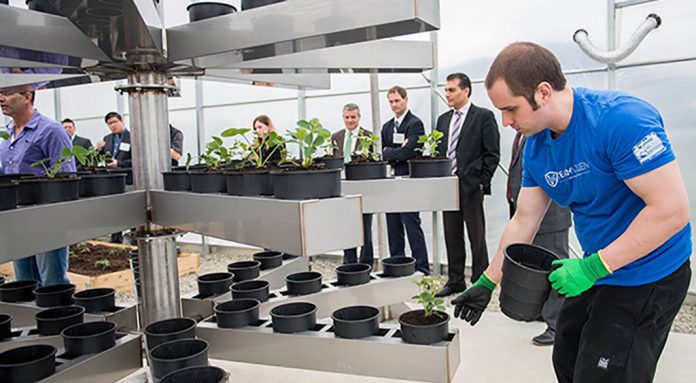UFV, with the John Volken Academy and the City of Surrey recently won an award for their BioPod partnership, a development that will provide opportunities to test local tech innovations as well as provide research opportunities for the agriculture sector.
The award for innovation and leadership in agriculture was presented by the Union of B.C. Municipalities, the B.C. Agriculture Council, and the Ministry of Agriculture.
Dr. Garry Fehr, director of the Agriculture Centre for Excellence at UFV has taken on the role of managing the partnership to ensure that all construction and programs are carried out effectively.
“It was really nice just to be nominated and noticed for it, but to be able to win was quite an honour,” said Fehr. “I think the real reason it won wasn’t so much for the technology but the way we integrated the technology with our partnerships.”
The BioPod itself is made up of two high-tech greenhouses connected by a common header house in a U-shaped formation. One side of the structure is used for research while the other side is a control to eliminate variables and monitor improvements. This year, the program is testing out the structure of the greenhouse covering material.
“What it is is a plastic poly. On one side we’ve got the standard plastic that’s used in the industry and on the other side what we’ve got is a high diffusion poly,” Fehr explained.
The high diffusion poly distributes sunlight throughout the greenhouse more evenly than a traditional poly covering resulting in virtually no shadows. Because the sun shines from the south, vertical growing apparatuses and multiple plant beds often cast shadows on other plants. Diffusing the sunlight allows for a broader coverage of all plants within the greenhouse.
“We’re just starting to crunch the data, but even within two weeks of planting we noticed that the diffused side was doing better than the other,” said Fehr.
Sor far, UFV students have not yet been involved with the project but Fehr says there is potential opportunity.
“If some of my colleagues in physics or chemistry or agriculture wanted to do research there, it would be great to have UFV students working on that research.”
Right now, all the working needs have been met by the John Volken Academy, an addictions treatment and rehabilitation centre. Part of their teaching and training is providing their program participants with opportunities to work in the greenhouse.
UFV will recognize the John Volken students’ work with a horticulture technician statement of completion. Although not a diploma or certificate, it officially recognizes their involvement and experience working within a greenhouse.
Most of the crop produced is harvested and used by the academy in their kitchen as part of their partnership. However, some of the surplus may be sold at an adjoining grocery store owned by the John Volken Foundation. Fehr said that they intend to get an organic certification and would like to expand so that more food could be produced for the community.
In addition to the high diffusion poly, the BioPods are also hosting the testing of Affinor Growers’ vertical growing system in the greenhouse.
The vertical growing system is essentially a vertical post with four levels, each with five troughs that hold the plants. The tower rotates to allow even distribution of light, and as it does this, each plant is drip fed water and nutrients by an external pump. Unabsorbed nutrients are collected and recycled through the system. By utilizing the vertical space not typically occupied within a greenhouse, the system has the ability to increase production per square metre.
“We were getting what we think is more than 10 times the production per square metre of floor space,” said Fehr. “The other thing we’re getting, and we haven’t yet figured out why, these plants normally produce about 300 grams in a season and we’re getting over 400 grams of production.”
Currently, the BioPod has only one Affinor growing system but will be receiving a second later in October.
“Affinor Growers is a fairly new company so they’re getting into this as they can afford it,” said Fehr.
Affinor Growers is a Vancouver-based farming-tech company who recently went public on the stock market.
“This is a great way to support innovation in the agricultural sector,” said Fehr, who hopes to see the space expanded and used for multiple research projects. “There’s a shortage of demonstration space. If you’re a greenhouse grower, you’re not about to give up a greenhouse for someone to test their new invention.”
This winter, the project is expecting to test more prototypes in the greenhouses. Some of these demonstrations include use of supplemental lighting, robotic monitoring of individual plant health, and a machine that condenses water out of the air into potable drinking water. Simon Fraser University will also get involved providing maintenance for the BioPod.
“I think the technologies we’re looking at could certainly add huge value to greenhouse operations,” said Fehr, who also noted that a major success of the partnership has been providing job training for students of the Volken Academy who may not find the same kind of training any other way.


